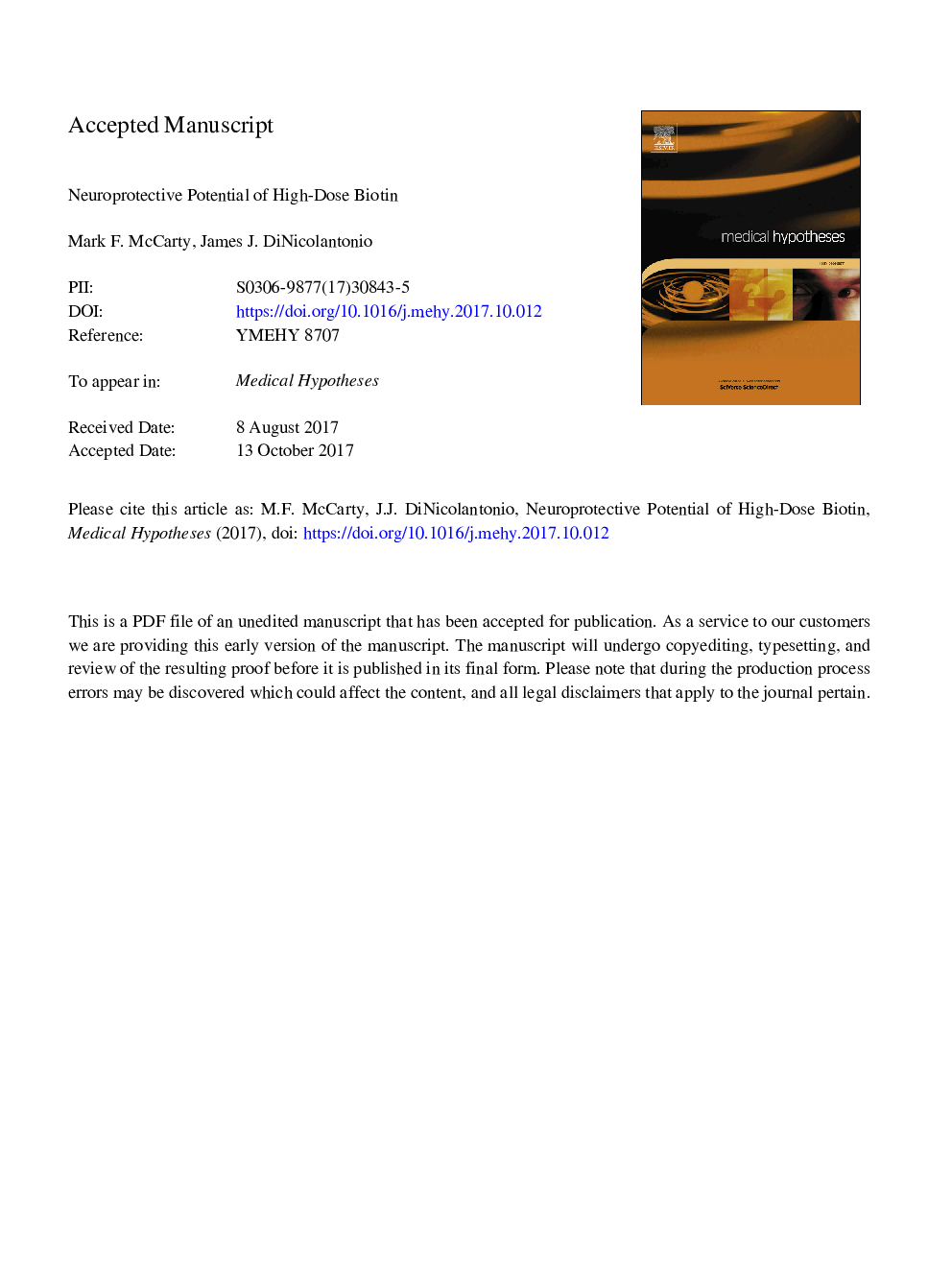| کد مقاله | کد نشریه | سال انتشار | مقاله انگلیسی | نسخه تمام متن |
|---|---|---|---|---|
| 8516125 | 1556536 | 2017 | 22 صفحه PDF | دانلود رایگان |
عنوان انگلیسی مقاله ISI
Neuroprotective potential of high-dose biotin
ترجمه فارسی عنوان
پتانسیل عصبی حفاظت بیوتین با دوزهای بالا
دانلود مقاله + سفارش ترجمه
دانلود مقاله ISI انگلیسی
رایگان برای ایرانیان
کلمات کلیدی
cGMPBeta-amyloid - بتا آمیلوئیدAlzheimeŕs disease - بیماری آلزایمرBiotin - بیوتین، ویتامین B7،فاکتور W، کوآنزیم R، ویتامین HSchwann cells - سلول های SchwannSoluble guanylate cyclase - سیکلاس گوانیلات حل کنندهNeurotrophic factors - عوامل نوروترفیکPhosphodiesterase-5 - فسفودی استراز 5Multiple sclerosis - مولتیپل اسکلروزیس(ام اس)protein kinase G - پروتئین کیناز G
موضوعات مرتبط
علوم زیستی و بیوفناوری
بیوشیمی، ژنتیک و زیست شناسی مولکولی
زیست شناسی تکاملی
چکیده انگلیسی
A recent controlled trial has established that high-dose biotin supplementation - 100â¯mg, three times daily - has a stabilizing effect on progression of multiple sclerosis (MS). Although this effect has been attributed to an optimization of biotin's essential cofactor role in the brain, a case can be made that direct stimulation of soluble guanylate cyclase (sGC) by pharmacological concentrations of biotin plays a key role in this regard. The utility of high-dose biotin in MS might reflect an anti-inflammatory effect of cGMP on the cerebral microvasculature, as well on oligodendrocyte differentiation and on Schwann cell production of neurotrophic factors thought to have potential for managing MS. But biotin's ability to boost cGMP synthesis in the brain may have broader neuroprotective potential. In many types of neurons and neural cells, cGMP exerts neurotrophic-mimetic effects - entailing activation of the PI3K-Akt and Ras-ERK pathways - that promote neuron survival and plasticity. Hippocampal long term potentiation requires nitric oxide synthesis, which in turn promotes an activating phosphorylation of CREB via a pathway involving cGMP and protein kinase G (PKG). In Alzheimer's disease (AD), amyloid beta suppresses this mechanism by inhibiting sGC activity; agents which exert a countervailing effect by boosting cGMP levels tend to restore effective long-term potentiation in rodent models of AD. Moreover, NO/cGMP suppresses amyloid beta production within the brain by inhibiting expression of amyloid precursor protein and BACE1. In conjunction with cGMP's ability to oppose neuron apoptosis, these effects suggest that high-dose biotin might have potential for the prevention and management of AD. cGMP also promotes neurogenesis, and may lessen stroke risk by impeding atherogenesis and hypertrophic remodeling in the cerebral vasculature. The neuroprotective potential of high-dose biotin likely could be boosted by concurrent administration of brain-permeable phosphodiesterase-5 inhibitors.
ناشر
Database: Elsevier - ScienceDirect (ساینس دایرکت)
Journal: Medical Hypotheses - Volume 109, November 2017, Pages 145-149
Journal: Medical Hypotheses - Volume 109, November 2017, Pages 145-149
نویسندگان
Mark F. McCarty, James J. DiNicolantonio,
